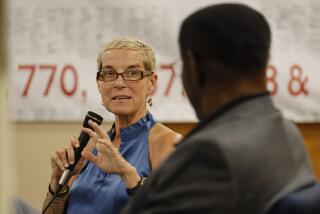To Him, No One Was a Natural Enemy
- Share via
When Marvin Brody died recently in San Franciso at age 80, the business world lost a guiding star. He was an unusual man and an important force in shaping a new model of cooperation between management and labor. But, because he always worked behind the scenes, few people knew of him.
Brody was a socialist and a union man to the core, yet his ideas went against the grain of traditional unionism. Convinced that management and labor had to work together if the American economy was to survive, he helped establish a prototype of labor relations at NUMMI (New United Motor Manufacturing Inc.), the celebrated GM-Toyota joint venture in Fremont, Calif. Once a GM plant that was closed in 1982 because it was unmanageable, it reemerged two years later and has since become an economic powerhouse producing cars that equal those produced by Toyota in Japan.
Historic struggles forged Brody’s beliefs. His father fled Lithuania just ahead of the Russian army in 1917, bringing the family to Cleveland. As a child he learned about radical politics and Zionism listening to speeches as he crawled around under banquet tables. Later, in 1933, like the Joads in Steinbeck’s “Grapes of Wrath,” the Brodys moved west to Los Angeles with their belongings tied to the top of an old Model-A Ford. Growing up in ethnic Boyle Heights in East Los Angeles taught Brody some useful lessons. “The whole thing was interesting because you got into the whole gang thing with Hispanics versus the Jews or the Russians, Japanese . . . ,” he said in an interview in 1992. “We learned a lot about each other and there just wasn’t any viciousness involved. It was a business of just trying to live with each other and get along.”
As a member of the CIO, Brody was an unabashed radical. He explained in the interview that the CIO was full of Communists. “We did whatever we had to do to radicalize the workers to take over the system,” he said.
In 1941, Brody joined the Navy and was assigned to a ship in the South Pacific. He recalled, “I was the only Jew on board, but they didn’t call me Jewish. They called me an A-rab. Some were racists. But I didn’t let it bother me . . . And, I didn’t worry about helping the capitalist class. We were fighting for something much bigger!”
After the war, he became an organizer and union official in Southern California’s booming aircraft and auto industries and later worked as West Coast political director for the United Auto Workers’ Walter and Roy Reuther. In the early 1980s, he signed up with Bruce Lee, director of the UAW’s Western Region, who was faced with a massive wave of shuttered factories. Lee played a key role in establishing NUMMI, and he depended heavily on his old friend for behind-the-scenes help. “Marv helped defuse the anti-Japanese sentiment and neutralized the opposition within the union,” Lee said. “His talents helped create thousands of jobs and a new way of working with management.”
Astonishingly, Brody next took the unusual step of becoming a key part of NUMMI’s lobbying effort. In doing so, he was able to reach conservatives as well as liberals in the effort to keep the company expanding and sharing the wealth with workers.
Marv Brody was a unique man of great integrity with an uncanny ability to understand an issue from all sides. By expanding the common ground between management and labor, he helped etch the outlines of a new social compact, one that is still in an embryonic state but one that is of immense importance to America.
More to Read
Inside the business of entertainment
The Wide Shot brings you news, analysis and insights on everything from streaming wars to production — and what it all means for the future.
You may occasionally receive promotional content from the Los Angeles Times.










